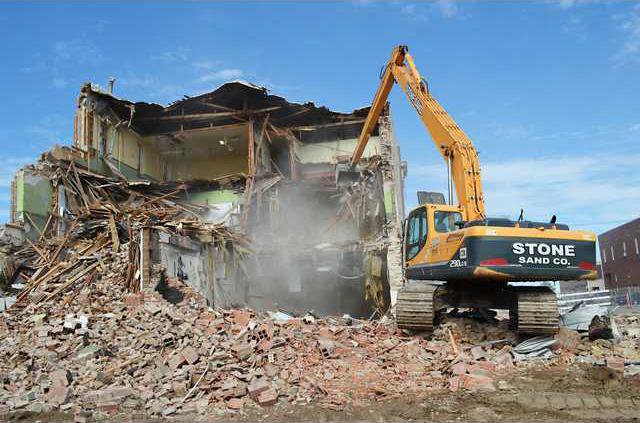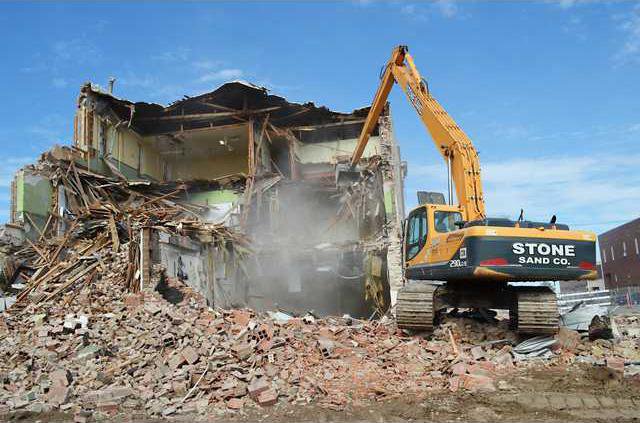The beleaguered old opera house on the corner of Forest in Williams in Great Bend didn’t put up much of a fight Tuesday.
The sounds of shattering glass, splintering wood and crumbling brick echoed through downtown Great Bend as the historic structure came tumbling to the ground at the hands of Nelson Stone and his bright yellow excavator. Billowing plumes of dust hung in the air and the ground shook.
Stone deftly maneuvered the massive machine’s long clawed arm. It chewed away at the building, ripping off bites of brick plaster and wood and leaving gaping holes in the walls.
As the floors and interior walls collapsed, Stone used the scoop on the excavator to punch the material and compress it.
Last week, a safety fence was installed around the opera house. Starting Monday, Stone’s crew brought in dump truck loads of dirt and covered the sidewalks and streets within the perimeter.
The dirt was packed down. It was there to act as a cushion to protect the asphalt and concrete below from the falling debris.
The actual razing started at about 11 a.m. Tuesday. By 1 p.m., the entire back half of the building was gone, allowing the numerous spectators to see inside the old giant – the doors, the light fixtures, the plumbing and the graffiti.
As Stone stripped away the tin siding that cover the east side of the building, an advertisement painted on it was revealed. But, in a matter of seconds, that segment of the wall lay in a heap of bricks.
Throughout the day, crowds of onlookers stood transfixed. The work also forced the closure of portions of Forest and Williams streets, causing traffic to detour around the site.
By the end of the day, little more than the front facade remained standing. The walls and bowels of the building sat in a twisted mound of broken bricks, tiles and wood.
Work will resume today.
The City Council in September approved hiring Nelson Stone of Great Bend for $90,500.
The building is also known as the Pitcock Building because it is owned by David and Barbara Pitcock.
The council also approved the closure of portions of these streets periodically during the procedure. The cost of the work will be covered by the city and charged back to the Pitcock’s taxes. The city is also looking into other legal procedures to get its money back.
It is not just a matter of tearing the building down, city officials said. The adjoining building shares a wall and it may also be damaged during the work. It would need to be repaired to maintain its structural integrity.
Officials said the opera house was originally built as a free-standing structure. The buildings adjoining it built up against it, making the shared wall a party wall, making the demolition extra tricky.
When the opera house is gone, it will be up to the neighboring building owners to maintain the wall and weather proof the exterior, officials said.
The building had been condemned after portions of it collapsed last December, forcing a dance studio and a resident to relocate. In March, the Council set deadlines for either the preservation or demolition.
In February, officials prepared the paperwork to find the building “an unsafe and dangerous structure.” They said they had been in contact with the owners, but had difficult time reaching them except via text messages.
The issue stretches back over two years. The city sent its first complaint letter to the owners in March 2012 after receiving an engineer’s report from MKEC Engineering Consultants of Wichita based on a November 2011 inspection.
Schneider said he received the report because the owners would not respond to the MKEC’s concerns about “structural deficiencies” in the building. MKEC attempted to contact the owners via mail and phone.
A second complaint was sent on Oct. 25, 2013, after more bricks had fallen. Attempts to reach the Pitcocks were again unsuccessful, officials said.
On Oct. 31, 2013, the city received a letter from David Pitcock.
In the letter, Pitcock said he is considering legal action. But, they have done nothing with the structure and no action has been taken.
Dating to the 1880s, the building originally served as an opera house, according to the Barton County Historical Society. Over the decades, it has also housed numerous businesses, including a furniture store, and offices.
The society has campaigned to save the building in the past.
The sounds of demolition reverberate as building succumbs





